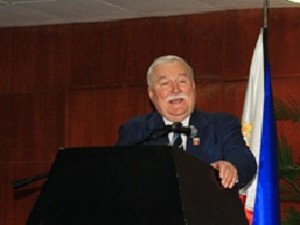Nobel laureate Lech Walesa on how to protect gains of democratic reform

Walesa’s talk centered on protecting the gains of democratic reform from the enemies of change, touching on three issues affecting growth and development in both the Philippines and Europe, such as the lack of unity among citizens and among nations, the effects of unemployment, and the conduct of today’s political leaders.
He spoke about the importance of learning from history, from the various wars and revolutions that have shaped Poland and Europe. “When we see what is happening to the world today, many will say that nothing can be done. This was told to me a long time ago, and I have proven them wrong,” reflected Walesa.
Drawing from his experience organizing strikes and forming the trade union Solidarity, Walesa emphasized that an increasingly borderless world must be built on collective values. “Unity must be built on values, and we have to agree on those values, including how we raise our children and how we build our justice system,” he stated.
The Nobel laureate also reflected on the state of the global economy, in light of the ongoing financial crises in the United States and in Europe. For Walesa, the fundamental concepts that have fueled capitalism, such as private ownership and the free market economy remain sound and useful. However, he believes that the lack of honesty, hard work, and solidarity in the capitalist system has led to the challenges that these economies now face today. To resolve the problem of unemployment, which has crippled many countries in Europe, Walesa suggested shifting the majority of the responsibility from the government to entrepreneurs.
“Only those who are holding the capital know how they can create the ‘wise work’—not politicians, not presidents, not those from the workers’ union. They are responsible for unemployment,” said Walesa. “If somebody there in Poland or here in the Philippines is not working, then everybody is losing. It is not worth it for anybody to have unemployment anywhere.”
Article continues after this advertisementOne of the challenges that Walesa also touched on was the declining trust in political leaders. According to the former Polish president, the conduct of today’s leaders have alienated people and discouraged them from taking part in the electoral process. To address this issue, Walesa suggests tracking the activities of political leaders and making the information accessible by the election period, to allow voters to make an informed decision.
Article continues after this advertisement“You want to be a politician? I have to know everything about you,” emphasized Walesa. He also proposed a “special rule” for politicians who will be caught committing electoral fraud—that for 50 years, his descendants would not be allowed to run for office.
At the end of his talk, Walesa urged the audience, comprised mostly of students, to do their share to enact change within their own communities, and to take advantage of the opportunities they have, such as their access to technology.
“This is the call of our generation. What I am talking about is possible to realize today. We have to start taking part in it,” underscored Walesa. “No generation had the chance as we have today. Let’s not destroy it. We are wise with our common wisdom. We are strong with our common strength. We have to want to want. We will have a beautiful Philippines, Europe, and the whole world.”
Through the Development-at-Work series at AIM’s Center for Development Management, students are able to interact with global leaders and change-makers, as part of efforts to facilitate practical application of knowledge to generate genuine development for communities and societies across Asia.